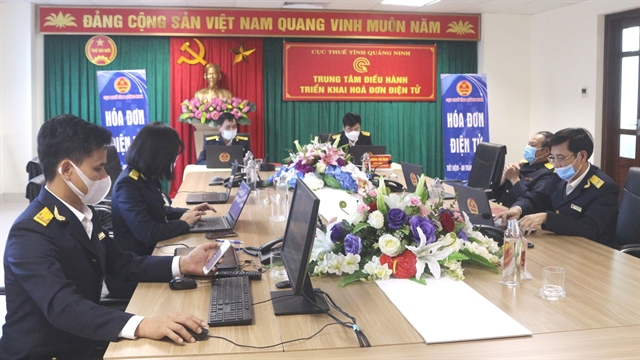 Politics & Law
Politics & Law


|
| Officers at the Tax Department of Quảng Ninh Province guide businesses on the e-invoicing process. — VNA/VNS Photo Thanh Vân |
HÀ NỘI — Some of the new policies taking effect in July include mandatory e-invoicing requirements, new-style passports, adjustments in regional minimum wages and the fee relief programme during COVID-19.
Regional minimum wage adjustments
Starting July 1, Decree No 38/2022/NĐ-CP issued last month comes into effect and set out the new ranges of regional minimum wages on monthly and hourly rates.
The new regulation is applicable to workers and employers under labour contracts in accordance with the Labour Code.
According to the document, the 6 per cent rise is equivalent to VNĐ260,000 (US$11.20) in Region 1, and VNĐ240,000, 210,000, and 180,000 in Regions 2, 3, and 4, respectively.
The new monthly minimum wage is now VNĐ4.68 million (US$201) per month for Region 1, and VNĐ4.16 million, VNĐ3.64 million, and VNĐ3.25 million for Regions 2, 3, and 4.
The hourly rate is also increased to VNĐ22,500 (US$0.97) for Region 1, and VNĐ20,000, VNĐ17,500, and VNĐ15,600 for the remaining regions, in the same order.
Region 1 covers Hà Nội and HCM City's urban areas; Region 2 encompasses Hà Nội and HCM City's rural areas, along with major urban areas in the country like Cần Thơ, Đà Nẵng and Hải Phòng; Region 3 covers provincial cities and the districts of Bắc Ninh, Bắc Giang and Hải Dương provinces; and Region 4 comprises the rest of the country.
The geographical classification is determined based on the employer’s place of operation.
E-invoicing becomes compulsory
According to the finance ministry’s Circular No 78/2021/TT-BTC, it is mandatory for businesses to scrap paper invoices and use electronic ones for their transactions from July 1.
Exceptions will be made for disadvantaged cases, including small and medium enterprises, cooperatives, household and individual businesses that don’t have the means to connect with tax authorities via electronic devices, or are without an accounting software system.
The e-invoice programme has been deployed in all cities and provinces across the country since April this year.
New-style passport for Vietnamese citizens
Starting from July, the Ministry of Public Security will start issuing the new-style passport to Vietnamese nationals, as per Circular No 73/2021/TT-BCA.
The new format is expected to ensure technical safety and prevent falsification.
To promote the image of Việt Nam to the world, each page of the new passport will be printed with symbolic images that represent the tradition, history, geography, sovereignty, heritage and culture of the country.
These include Hùng King Temple (Phú Thọ Province), Hạ Long Bay (Quảng Ninh Province), Huế Citadel (Thừa Thiên Huế Province), Hội An Ancient Town and Mỹ Sơn Sanctuary (both in Quảng Nam Province), Nhà Rồng Habour (HCM City), Lũng Cú Flag Tower (Hà Giang Province), and the Tò Vò Arch on Lý Sơn Island (Quảng Ngãi Province).
Fee and charge support for COVID-hit individuals to end
Starting July, 37 types of fees and charges, which have been reduced to relieve the COVID-19 impact, will return to the normal rates.
These include issuance fees for chip-based ID cards, passports, and other registration certificates, as well as for road use.
Following Circular No 120/2021/TT-BTC issued by the Ministry of Finance in December last year, these charges were reduced by 10 to 50 per cent for the first six months of 2022. — VNS




